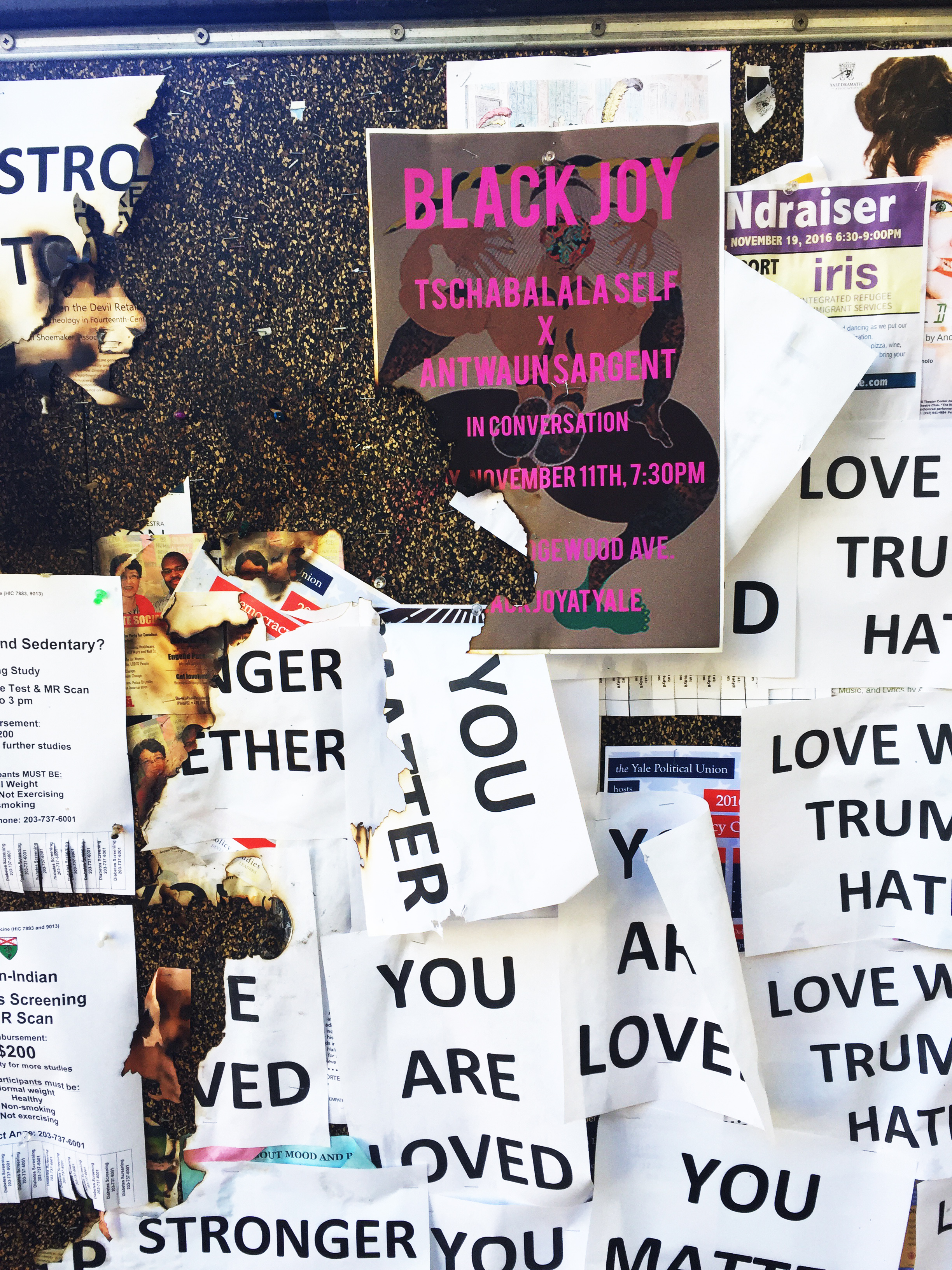
Courtesy Shikeith Cathey
A poster for “Black Joy,” a School of Art event aimed at celebrating black arts and culture, was found burned on a bulletin board outside Sterling Memorial Library last Thursday. The incident added Yale to a long list of universities grappling with public gestures of hatred in the intense emotional aftermath of President-elect Donald Trump’s unexpected victory on Election Day.
On Nov. 10th, two curators of “Black Joy,” Shikeith Cathey ART ’18 and Vaughn Spann ART ’18, found their poster on the board burned alongside an anti-Trump poster that read “Stronger Together.” According to its Facebook page, “Black Joy” — which was scheduled before the election — is designed to utilize “black arts and culture to conjure joy and wellness amongst the community.”
After the incident,Risë Nelson, director of the Afro-American Cultural Center, contacted the Yale Police Department and decided to provide plain-clothes security for the event, which took place between Friday and Saturday night. Kuzma sent an email to the Art School community Friday afternoon denouncing the burning.
“The act of burning of that poster is to be condemned,” Kuzma wrote in the email. “We should seek to understand why it is that we have reached this point and how we can continue to vigilantly protect any aspect of a future from collapsing in terms of openness, diversity and yes, democracy.”
She also likened the burning to the “acts of unauthored aggression” that occurred in the U.K. after the Brexit vote. In her email, Kuzma attached a list of Yale’s mental health and safety resources.
In spite of the vandalism, Cathey noted that the event proceeded as planned and was met with a full house during its scheduled showcases.
Cathey and Spann both called the burning “jarring” and connected this incident to the historical abuse of the bodies and property of African-Americans.
Still, they said they were reassured by the administration’s swift response, including a personal email from Nelson, and Kuzma’s offer of plain-clothes security.
“They can burn our flier, not our joy,” Cathey said.
In her email, Kuzma placed the burning in the context of “a series of other transgressions that occurred across campuses nationwide” in the wake of the election. Nelson sent an email to the Af-Am House community Thursday night, providing words of comfort and encouraging students to “feel [their] feelings” after the election. The email was titled “#BlackJoyWillNotBeStolenAtYale,” though there was no mention of the burning incident.
Samuel Messer, associate dean of the Art School, said the burning was violent because it could potentially lead to more harm. He added that Yale needs to stay constantly aware of conversations outside the Yale “bubble” to prevent further anonymous violence. Messer also warned that simply blaming this action on the election results will blind the community from noticing the real issue of racism.
“I think it is diminishing the issue of racism to blame it only on the election,” Messer said. “The election has brought up a huge divide in our country and gives permission to voice that kind of action. I fear people will attribute it to the election and feel comfort.”
Felipe Baeza ART ’18, who saw the burned poster Thursday afternoon, said it is important for the entire Yale community to know about the incident. Baeza added that even if it wasn’t someone from Yale who set the poster on fire, that person still came from Yale’s surrounding community and validated similar feelings of hatred on the University’s campus.
Many other academic institutions have also reported similar cases of vandalism, hate speech and actions on their campuses. Last Friday, the University of Pennsylvania released a formal statement in response to the dissemination of racist GroupMe messages to a group of black freshmen. San Diego University, New York University, San Jose State University and the University of Michigan have all dealt with episodes of vandalism, racism and even public violence this past week.
“Black Joy” is a part of a wider program at the Art School to use the Expropriated Investigatory Kabinet, an art space located in Yale’s 32 Edgewood Gallery, to generate open and respectful arts programming.
Correction, Nov. 14: A previous version of this article misattributed the quote “They can burn our flier, not our joy” to Vaughn Spann. It also misstated who alerted the Yale Police to the burned posters and requested plainclothes security.







